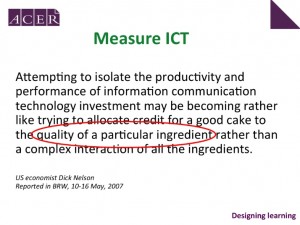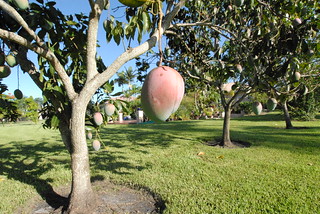Here's what I plan to present in my 7 minute presentation at the Adelaide TeachMeet on Thursday afternoon.
TeachMeet Adelaide Presentation Script - "Innovation + Leadership = Change "
Hi, I'm Graham Wegner. I'm currently an Assistant Principal at Woodville Gardens School B-7 with a focus on Learning Technologies and Admin but prior to this appointment, I was the ICT Coordinator at Lockleys North Primary starting in 2003. My current school is fortunate enough to be part of a DECD Innovative Learning Environment project group which is an interesting experience in itself. The schools that are part of this project are all doing things that fall outside the bounds of what other schools think is possible or permissible within our state education system, or in the case of the three PPP (Private Public Partnership) schools or "super schools" as we've been dubbed by the media purpose built with a view to doing things differently and encouraging innovation. There are lots of aspects of our school's physical designs that move teacher thinking away from the isolated classroom approach to education, and we have been set up well with an excellent wireless network but innovation that leads to meaningful change doesn't just happen because the physical environment suggests it. Another interesting aside is that all three PPP schools in the project (Blair Athol North, Mark Oliphant College and us) all serve complex, lower socio-economic communities so it could be interpreted that there is a realisation that the way school has always been done hasn't served these communities well and that the magnifying effects that disadvantage can have on student learning outcomes needs innovative thinking to effect change.
And it is this idea of innovation linked to change that I'd like to discuss in the time I have here this afternoon. In general, throughout the world, innovation drives change, with the goal being that this change is for the better, be it better ways to communicate, better ways to solve crime, to entertain ourselves, to cure or relieve ailments and so on. Education has been labelled, fairly or otherwise, as an institution that is slow to change and is in fact, a very difficult way for innovation to take place and flourish. However, we are at a point in time where the advancement of technology, the product of innovation, is forcing change throughout the world - some of it political as we can see in examples like MySchool and teacher accountability measures, some of it social in examples like Facebook and YouTube - and there is a real societal backlash landing back on schools as a result. And large systems like DECD aren't well equipped to be nimble and adaptive to external change pressure - and we as educators cop flak about the bad teachers, the worthless SACE subjects, the social media entanglements that our students get involved in, the lack of male teachers and are painted as this conservative bunch who shut the classroom door each day and forget that the outside world exists.
Except that doesn't really happen. There are plenty of innovative educators out there and it wouldn't be a stretch for me to generalise that all of us here tonight at this TeachMeet are innovators of sorts, or at least, see ourselves as agents of change. We are the first to try things out at our respective sites. We are the ones who change things for our students - and we find it enormously frustrating that others, sometimes the considerable majority that the media must be referring to when the profession is slammed in the papers, don't see the urgency or the opportunities that we see as being obvious.
A quick disclaimer then a quick example. When I portray myself as innovative, I know that it is all contextual and relative. Since becoming a networked learner who relies on the internet for self learning opportunities, I know that most of the ideas I've trialled in my classrooms have all been done before by other trailblazers scattered around the world. So, I'm referring to innovative in terms of the status quo for South Australian schools not as compared against other innovative ideas from around the world. Anyway, onto the example which has two parts. In 2006, I posted a presentation for the K12Online Conference titled "No Teacher Left Behind: The Urgency of Web 2.0" - a pretentious title for a pretentious topic. It was a rallying call for progressive educators to get on board with internet based tools and start networking with other educators to become better learners. Well, I could pull up the same presentation five and a half years later, and not a lot seems to have changed in classrooms in this neck of the woods. In 2008, I started student blogging at Lockleys North with my class and last year left a program being run by my immediate colleagues who saw the value in the innovation and made the change in their practice to offer this learning opportunity for their students. But upon my arrival at Woodville Gardens, I found that student blogging was a concept that hadn't hit classrooms yet and I realised (although I always susupected) that my participation in something innovative in South Australia hasn't translated to a change across more schools than the one where I first took up the innovation.
So, innovation can push towards change, but there is a missing ingredient that I believe that the collective "we" are responsible for - leadership.
Leadership can look like many things. It can be a formal role like the one I have now. But we all know that formal roles don't automatically translate to change either. I'm sure you all know of principals who believe that their job is to keep things running exactly as is - unless the department tells them otherwise. And it is no fun trying to be the innovative teacher in one of those schools either. But in a formal role, I have a better shot at influencing more educators compared to when I was the classroom teacher and could only influence the teachers next door to me. As a coordinator I could make inroads into a team or targetted group but those of us who are or have been coordinators know the difficult task that role can be. But as an Assistant Principal, I have the authority to determine school directions that can turn innovative ideas and programs into progressive more commonplace practice.
But not everyone wants an official leadership role. So leadership opportunities can be found elsewhere - and the most innovative space to do so is online. There are countless examples o f people who started an online presence from their classroom who wield enormous amounts of influence because they put their practices, their innovation in a place where anyone or everyone could find them. Try throwing these names into Google and see what you find - Brian Crosby, who works out of a classroom in Nevada who ended up presenting to international school educators in a major conference in China, international school leader Kim Cofino who posted about that 2006 presentation of mine pondering my advice and now is someone who I aspire to be like in terms of vision and getting real learning change happening. Try Dan Meyer, who was a young high school Maths teacher who started a blog for fun, is now doing a PhD and has worked for Google and Pearson, but still sees his blog as the best personal professional growth he could ever have - and for one closer to home, New South Wales high school teacher, Bianca Hewes, whose innovation in using Project Based Learning combined with student social networking tool Edmodo got her a trip of a lifetime to ISTE last year as Edmodo's featured blogger!
So, in closing, the problem with being innovative is that while you are always looking to improve things, it is hard to move on knowing that your initial innovations have not become commonplace. As I tweeted last year at one of the ILE conferences:
You can't have everyone being innovative 'cos it can't be innovation if everyone is doing it! #DECD_SA
So, my challenge to you all is to find your leadership niche so that your innovation can become positive, meaningful change. Thanks for listening.




